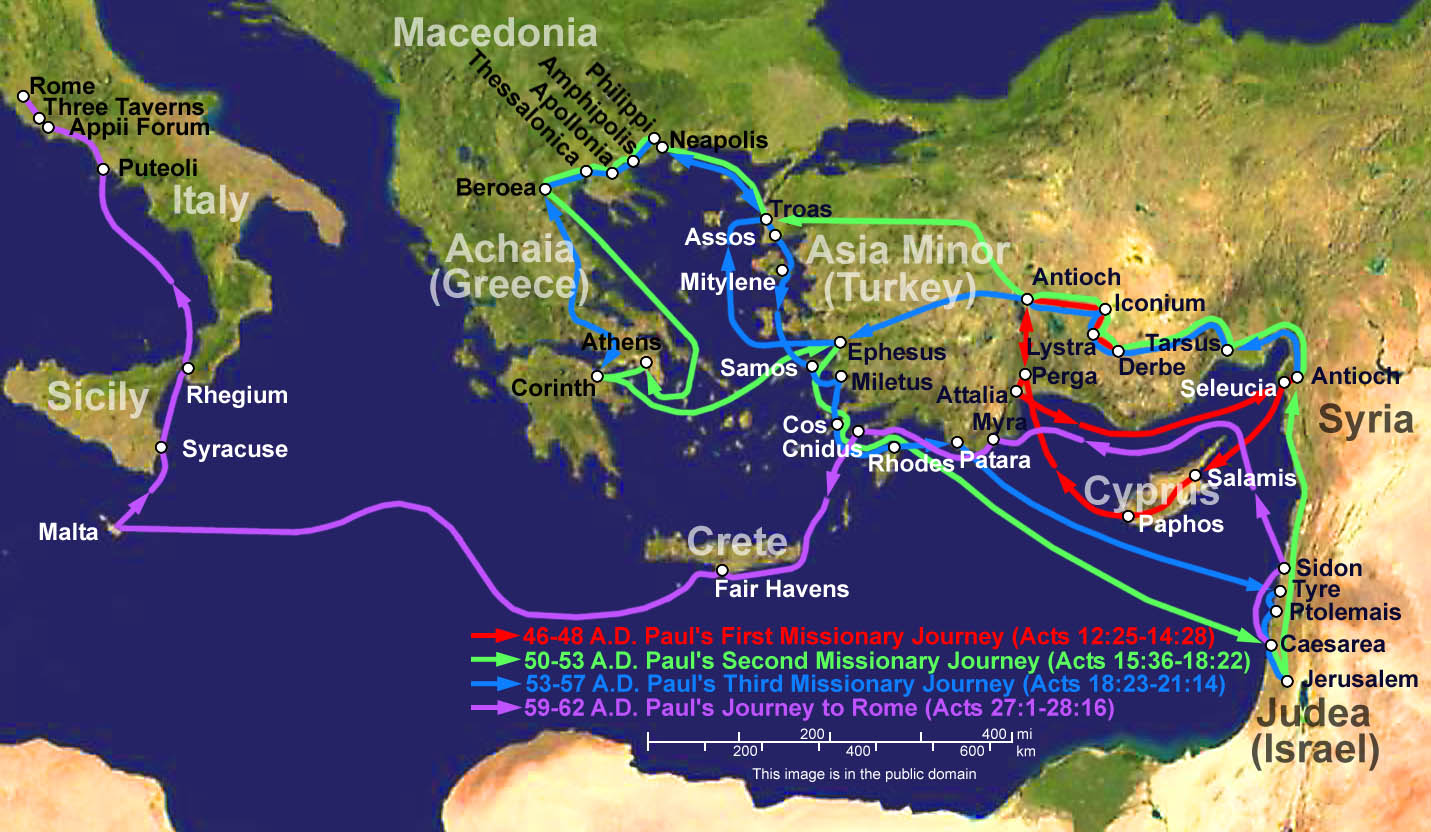

|
Acts of the Apostles is the one historical book of the New Testament, and much of what we know about the early years of Christianity comes from this book. It is mainly about two of the apostles - Peter and Paul. Peter was one of Jesus' original twelve apostles. Paul was not one of the original apostles, but he later adopted that title for himself.
Many familiar and dramatic events are told in Acts - Jesus' ascension to heaven, Paul's conversion, Paul's escape from Damascus, Peter's escape from prison, Paul's three missionary journeys, Paul's arrest, and the shipwreck on the way to Rome, to name a few.
The adventures of Peter and Paul, as they traveled and spread the message of Jesus, form an exciting tale. The table below lists some of the important events of the Acts story and their approximate dates.
Timeline of Acts of the Apostles and Related Events |
|
| 30 A.D. | Christ appears to the apostles after His resurrection (Acts 1:4-8). |
| 40 days after Christ's resurrection | Christ ascends to heaven (Acts 1:9-11). |
| Matthias is appointed to replace Judas as the 12th Apostle (Acts 1:15-26). | |
| 50 days after Christ's resurrection | The Holy Spirit comes to the apostles in the form of tongues of fire (Acts 2:1-4). |
| The apostles speak in tongues (Acts 2:5-13). | |
| Peter heals a lame man (Acts 3:1-10). | |
| 31 | Stephen is stoned to death and becomes the first Christian martyr (Acts 6:8-15, 7:54-60). |
| 31 - 34 | Saul persecutes the Christians (Acts 8:1-3). |
| 34 | Saul has a dramatic encounter with Christ on the road to Damascus (Acts 9:1-19). |
| Saul escapes from Damascus in a basket (Acts 9:23-25). | |
| Peter raises Dorcas (Tabitha) from the dead (Acts 9:36-43). | |
| 44 | King Herod Agrippa I orders the execution of the Apostle James (Acts 12:1-2). |
| An angel rescues Peter from prison (Acts 12:3-10). | |
| 46 - 48 | Saul's first missionary journey - Cyprus, Antioch, Iconium and Lystra. Saul becomes known as the Apostle Paul. (12:25 - 14:28). |
| 49 | Paul and Peter meet at the Council of Jerusalem to decide if Gentile Christians must observe the Jewish Law and customs (Acts 15:1-20). |
| 49 | Paul writes his First Letter to the Thessalonians - the earliest New Testament book. |
| 50 | Paul writes his Letter to the Galatians. |
| 50 - 53 | Paul's second missionary journey - Philippi, Thessalonica, Beroea, Athens and Corinth (15:36 - 18:22). |
| 53 - 57 | Paul's third missionary journey - Galatia, Phrygia, Ephesus, Macedonia, Troas, Miletus,Tyre and Caesarea (18:23 - 21:14). |
| 54 | 16-year-old Nero becomes emperor of the Roman Empire. |
| Eutychus falls asleep while Paul is preaching and falls out a window (Acts 20:9-12). | |
| 55 | Paul writes his First and Second Letters to the Corinthians. |
| 57 | Paul writes his Letter to the Romans. |
| 58 | Paul is arrested in Jerusalem (Acts 21:27-36). |
| 59 - 62 | Paul is taken to Rome for trial and shipwrecked on the way (27:1 - 28:16). |
| 67 | Nero orders the execution of both Peter and Paul. |
| 70 | The Roman Army attacks Jerusalem to suppress a Jewish revolt. The city and the temple are destroyed. |

Luke, a companion of Paul (Philemon 1:24) and a physician (Colossians 4:14), is traditionally believed to be the author of both books. This seems to be a good fit because someone who had traveled with Paul would know all the details of Paul's journeys that are told in Acts. Also, both books show an interest in medical matters that would be characteristic of a physician (Luke 8:43-44, Acts 28:3-6, 28:8). However, there is no way to be sure Luke was the author.
Acts tells of the birth of the Christian Church through the coming of the Holy Spirit. Throughout Acts, the Christian leaders are filled with the Holy Spirit to guide and empower their missionary work. From beginning to end, Acts tells how the Holy Spirit inspired, nurtured, guided and comforted the Church.
At the time Jesus was crucified, His disciples and followers were nearly all Jews. Acts tells how God's covenant with the Jews is now expanded to include all people of the world. The Christian leaders decided that the Gentiles who converted to Christianity did not have to observe the Jewish traditions about circumcision, diet, Sabbath observance, etc. This opened the way for large numbers of non-Jews to become Christians. As more and more Gentiles converted, Christianity lost its uniquely Jewish character and emerged as a separate religion.
The lives of the early Christians give us many examples of the ideals of Christian living. We see the holiness, dedication and boldness of Peter and Paul, the courage and forgiveness of Stephen, the piety and devotion of Cornelius, the trust of Barnabas, the obedience of Philip, and the idyllic communal life of the early Christians.
We also supply answers for some of the questions. However, for maximum personal benefit, you should answer all the questions yourself before looking at our answers. Our answers are given from a mainstream Christian and historical viewpoint. We use the best reference materials available to present the Bible as it was understood by the original audience in Biblical times. But God calls different people in different ways, and there is no single "right" answer for many of the questions; your answers may well be different from ours.
The Bible Studies are nonsectarian, and are suitable for use by all Christians. The vast majority of Bible passages are interpreted the same way by all mainstream Christian denominations. A few passages are controversial, and we will sometimes point out and explain the denominational differences.